Testing a mattress for free before trying it out is a fantastic opportunity. Here’s how you can try out online mattresses in person before buying.
Blog > Sleep 101: How to Sleep Better According to Science 2024
Blog > Sleep 101: How to Sleep Better According to Science 2024
Till the 1950s, sleep was considered a dormant activity, but today we know its importance. While we sleep, our body reboots, repairs, and recovers rapidly, making sleep necessary for survival, much like food and water. But in this always-connected, productivity-obsessed culture, getting quality sleep is a distant dream for many. About one in four Americans develop insomnia every year. Goal-oriented life, social pressure, stress, and responsibilities keep us on foot all day and don’t let us rest in the night.
Recent Insomnia Stats:

In this sleep guide, we will help you figure out how to sleep better at night and use your sleep to improve your productivity. Together we will figure out how much sleep you need, how sleep works, how sleep deficiency occurs, and the practical steps you can take to improve your sleep quality.
So let’s begin and tackle the first big question, how long you should snooze to get all the benefits of deep sleep.
The National Sleep Foundation suggests 7-9 hours of sleep for average adults. However, factors like age, gender, and health conditions also affect the amount of sleep you need to function.
So, how long should an average person sleep?
It’s a complex question to answer.
Let’s have a look at a few crucial factors:
Chronotype is our natural inclination towards the time we prefer to sleep. The Los Angeles based sleep doctor and the author of The Power of When, Michael Breus, identifies four different chronotypes based on:
| Dolphins |
|
|
| Lions |
|
|
| Bears |
|
|
| Wolf |
|
|
Figuring out your chronotype is quite simple. All you need to do is to monitor your sleepiness, alertness, and performance throughout the day.
Feeling tired even after 8 hours of quality sleep is a big sign that your bedtime routine isn’t aligned with your chronotype. Thus, you need to modify your sleep timings to match your biological clock if you want to unlock your true potential and prevent slugginess during the day.
But the question is, why is chronotype different from person to person?
The simple answer is, genes!
Scientists have identified the profound effects of genes on your sleep needs, chronotype, and susceptibility to sleep disorders. Till now, the National Institute of Health has identified as many as seven genes common among insomniacs.
Primarily, the amount of time you sleep is linked to two regions of your DNA:
The second region is also linked to an increased risk of depression and schizophrenia.
Despite that, you can still somewhat manipulate your sleep cycle through light exposure, exercise, and strict sleep schedules. Many other factors also have a profound effect on how much sleep we need. One of the most influential and researched parameters to figure this out is age.
Sleep requirements can be categorized into five different age groups based on the general lifestyle and body requirements.
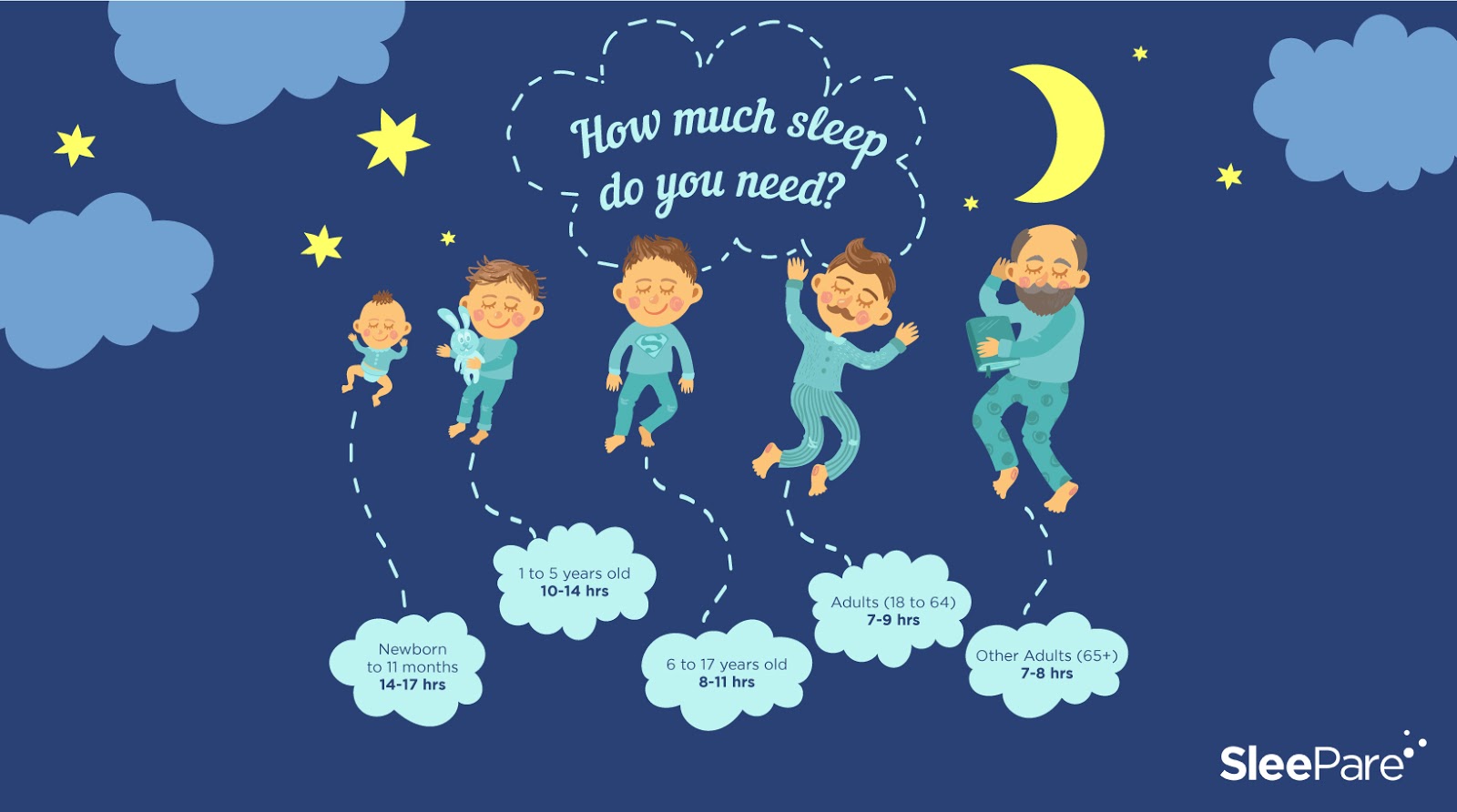
| Newborn to 11 months | 14 – 17 hrs |
| 1 to 5 years old | 10 – 14 hrs |
| 6 to 17 years old | 8 – 11 hrs |
| Adults (18 to 64) | 7 – 9 hrs |
| Older adults (65+) | 7 – 8 hrs |
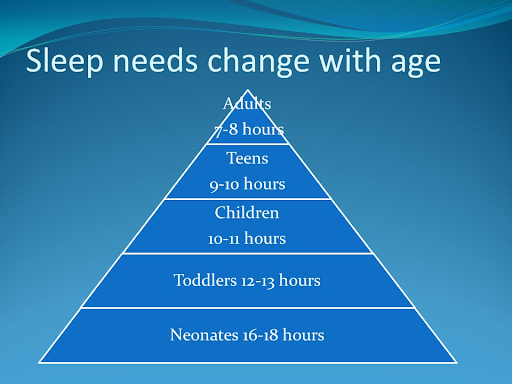
| Newborn to 11 months | Polyphasic | 2.5 – 4 hrs | Several naps throughout the day |
| 1 to 5 years old | Monophasic, short nap/s during the day | 3 – 4 hrs | The number of naps decreases from several to only 1, lasting for 3 – 4 hours. |
| 6 to 17 years old | Monophasic | 0 – ½ hrs | Seldom takes daytime naps. Some may take 15 minutes power nap. |
| Adults (18 to 64) | Monophasic | 0 – ½ hrs | Seldom takes daytime naps. Some may take 15 minutes power nap. |
| Older adults (65+) | polyphasic | 1 – 2 hrs | Take 1-2 naps lasting for a few hours to cover up night sleep loss |
According to the National Institutes of Health, our sleep requirements decrease as we grow older.
Kids need the most sleep as it’s crucial for their proper growth and learning. That’s why babies take many naps throughout the day. By their first birthday, their sleep stabilizes with increased nighttime snooze.
As you grow older, your sleep patterns are set, but the time you spend in bed decreases. During the teenage years, your biological clock shifts to match hormonal changes, studies schedule, and excessive exposure to blue light.
The older we get, the less we sleep; however, our bodies still require 7-9 hours of rest to function optimally. But elderly folks are unable to sleep for long hours continuously. They mostly sleep lightly, so they get interrupted with the slightest movement. That’s why older people take regular naps during the day to cover the sleep loss.
But, it’s the younger adults who miss out on their sleep the most and are at risk of developing sleep problems. Not only the sleep duration but quality of rest is also crucial for well-rested, rejuvenated mornings.
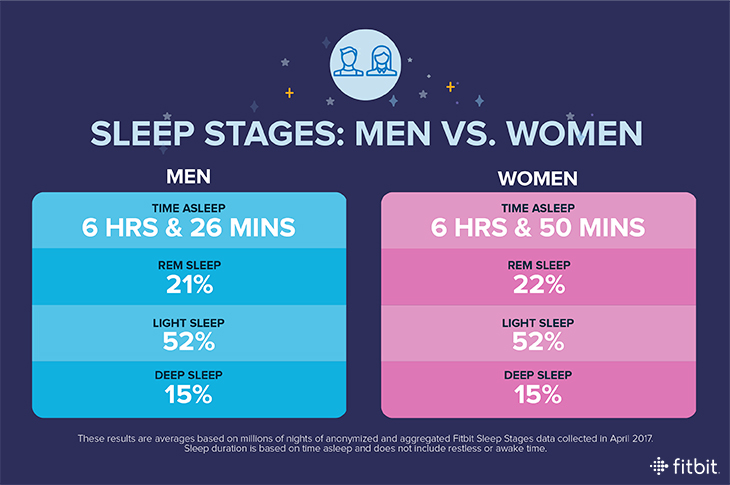
Although sleep data shows little difference based on gender, according to a study by Professor Jim Horne, director of the Sleep Research Center at Loughborough University, on average, women sleep 20 minutes more than men each night.
“And that’s down to a woman’s busy, multitasking brain.” The researchers propose.
The more brain you use during the day, the more sleep you need to regenerate and recover. Women often need to juggle a job, home, family responsibilities, and childcare on a daily basis. This multitasking exhausts them physically and mentally more than men.
As researchers note, “A man who has a complex job that involves a lot of decision-making and lateral thinking may also need more sleep than the average male – though probably still not as much as a woman.”
So, there you have it, girls — if you and your male partner often play the game of competitive tiredness, you can always quote science to win the argument. A leading U.S. commentator on health and wellness, Arianna Huffington declares women’s sleep ‘the next feminist issue’ and a significant hurdle preventing women from achieving their true potential.
On the contrary, Dr. Ulrich Voderholzer and his fellow researchers argue that “studies indicate that gender seems to have, if any, relatively little influence on sleep per se.” Hormonal fluctuations due to menstruation, pregnancy, and menopause, along with the increased level of stress, all play a vital role in causing sleep problems in women.
They also believe that women are more at risk of sleep disorders because of the “gender differences in the prevalence of anxiety and depression.”
Many studies, similar to the one by The Society for Women’s Health Research (SWHR), Washington, DC, show that women take longer to fall fully asleep. Their NREM and REM phases are short compared to men, which means low-quality sleep. It also puts them at a higher risk of developing insomnia, Restless Legs Syndrome, and other sleep-related illnesses.
Let’s see what’s REM and NREM and how it impacts your body and mind.
Our sleep isn’t a numbers game.
Despite all the research, surveys, and experiments, humans are still far from decoding the exact science behind sleep. Yet one thing is as clear as day; it’s much less about the number of hours, and much more about the quality of the sleep you get.
Let’s explore how does sleep work…
Our sleep is a cyclic process with four distinct phases. One sleep-wake cycle takes 90 – 120 minutes to complete, and an average person undergoes 4 or 5 cycles per night.
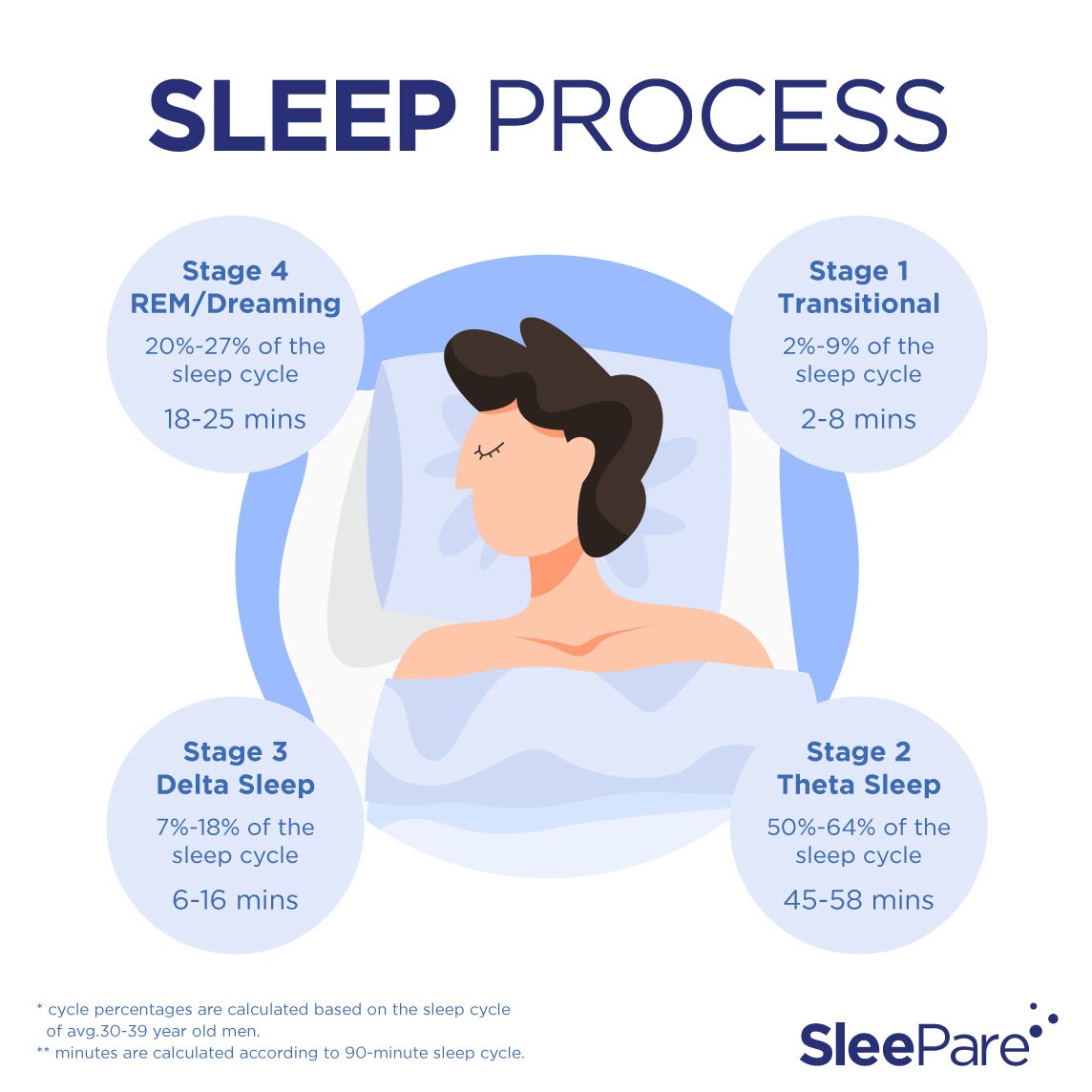
The following table briefly describes the major characteristics of all four stages of sleep.
| Stage 1 (Non-REM) |
|
| Stage 2 (Non-REM) |
|
| Stage 3 (Non-REM) |
|
| REM |
|
NREM is also called quiescent or dreamless sleep. You spend 80% of your sleep in NREM mode and 20% in REM sleep. Stage 3 NREM is the deepest sleep phase, and it’s difficult to wake a person during this phase. The response to external stimuli is minimal. If a person does wake up during NREM Stage 3, he feels disoriented and groggy for some time.
At the end of each cycle, the body enters NREM Stage 1 again, and the cycle continues. Two of these four stages are the most important in regards to sleep quality:
At the beginning of your sleep, slow-wave sleep duration is longer, and the REM phase is shorter. However, as the night progresses, and your body becomes well-rested, deep sleep becomes shorter while the REM phase progressively becomes longer.
Over the last two decades, the link of sleep to learning, memory consolidation, and cognitive functions has been researched extensively by scientists like Huber, Born J., and their fellow researchers.
Each of these stages plays a different role in our rest and recovery. To keep it simple, NREM is associated with the repair of the body, while REM sleep is responsible for restoring the mind to its normal functional state. However, there is much overlapping and interdependence.
For instance, in an experiment, scientists deprived healthy individuals off of slow-wave sleep without changing their duration of the overall sleep. A sharp decrease in several higher mental abilities was evident.
On the other hand, when participants in a study were deprived of REM sleep, they were unable to recall what they had learned just before sleeping. But, they could still retrieve some information when they were deprived of slow-wave sleep only.
Let’s have a look at some of the most interesting benefits of sleep.
We take our rest for granted, but research shows how crucial it is to get at least 6-7 hours of sleep each night. According to Dr. Merrill Mitler, a sleep expert and neuroscientist at NIH, “Sleep services all aspects of our body in one way or another: molecular, energy balance, as well as intellectual function, alertness, and mood.
Research today is more focused on the benefits of sleep than studying the detrimental effects of sleep deprivation. So far, scientists have uncovered many immensely important benefits. Many theories about the function of sleep are being put to scientific scrutiny.
Let’s have a look at what scientists have figured out so far, and believe me, you don’t want to miss out on any of them!
Scientists have enough evidence to prove that sleep is extremely crucial for the maintenance of our physiological functions. According to the researchers at the University of Wisconsin, sleep increases the production of our regenerative brain cells. Most tissue repair, protein synthesis, and muscle growth also occur during sleep.
When we’re awake, a chemical, adenosine, builds up in our body due to the breakdown of energy molecules. Interestingly, this chemical is also linked with sleepiness. During sleep, it absorbs in the brain’s waste clearance system and gets eliminated by the body. As Dr. Nedergaard, University of Rochester Medical Center of New York, sums it up nicely, “We need sleep. It cleans up the brain.”
Scientists have enough evidence to prove that GH is released during sleep. Although G.H. levels are at its peak during youth and steadily decline with age, the sleep cycle and its disruption affect G.H. release at any age significantly. Studies further show that G.H. surge is absent if you stay awake during your usual sleep time and occurs only during your ZZZs.
Extensive studies involving both humans and mice show a strong connection between learning and sleep.
Researchers of the New York University School of Medicine experimented on rice to explore the connection between learning and sleep. They noticed that the neural cells stimulated during different learning tasks in mice, activated again while they were asleep.
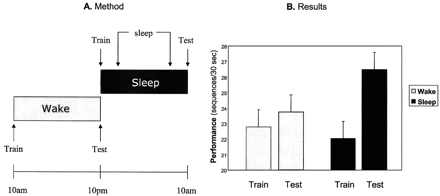
Another research compared the performance of two groups of students after they got training for a new skill. One group was allowed to sleep overnight before the test, while the other stayed awake.
Although they were tested after an equal duration of time, the group that slept performed better than the group that stayed awake during the break.
So, we understand that sleep is absolutely essential for the proper functioning of our body. Now the question is, how does our body know when to sleep and when to wake up? Is it an acquired behavior or something as autonomous as circulation or digestion?
Sleep is the backbone of our health and wellness. So, we need to dig a little deeper into the science of sleep to understand if and how we can preserve this intricate balance of sleep and wakefulness.
Dr. Alexander Borbely presented his 2-Process Model of sleep regulation in 1982. He identified two processes that influence our sleep and wakeful states.
Let’s discuss each of them briefly.
It’s your internal biochemical system that acts as a timer. According to Borbely, some sleep-inducing substances accumulate in your brain and create an urge for sleep. The longer you’re awake, the more substances collect in your body, and thus you experience a stronger urge to sleep.
A pioneering chronobiologist and scientist, Michel Siffre, conducted an intriguing experiment to prove the presence of sleep-wake homeostasis.
He lived like a spartan in a cave for six months to study his biological rhythm. He had a single yellow bulb, a large stock of frozen food, and 800 gallons of water. Since he had no connection with the outside world, he had no way of knowing when it was day or night.
Interestingly, in the absence of day and night, his sleep cycle got slightly longer, about 24 hours 30 minutes. He also occasionally transitioned to a 48-hours sleep cycle when he would sleep for 12 hours after staying awake for 1.5 days.
He recalls, “My sleep was perfect. My body chose itself when to eat and sleep.”
In a nutshell, the sleep-wake homeostasis causes a drive to sleep and wakes up the body when it has rested, and the sleep pressure is low. If sleep stress is accumulated for a week or so due to poor sleep, then our sleep-wake homeostasis puts us into deep sleep forcibly to catch up for the missed hours.
However, this homeostasis cannot work alone. It only causes the pressure to sleep but needs the circadian rhythm to maintain the daily cycle of sleep and wakefulness.
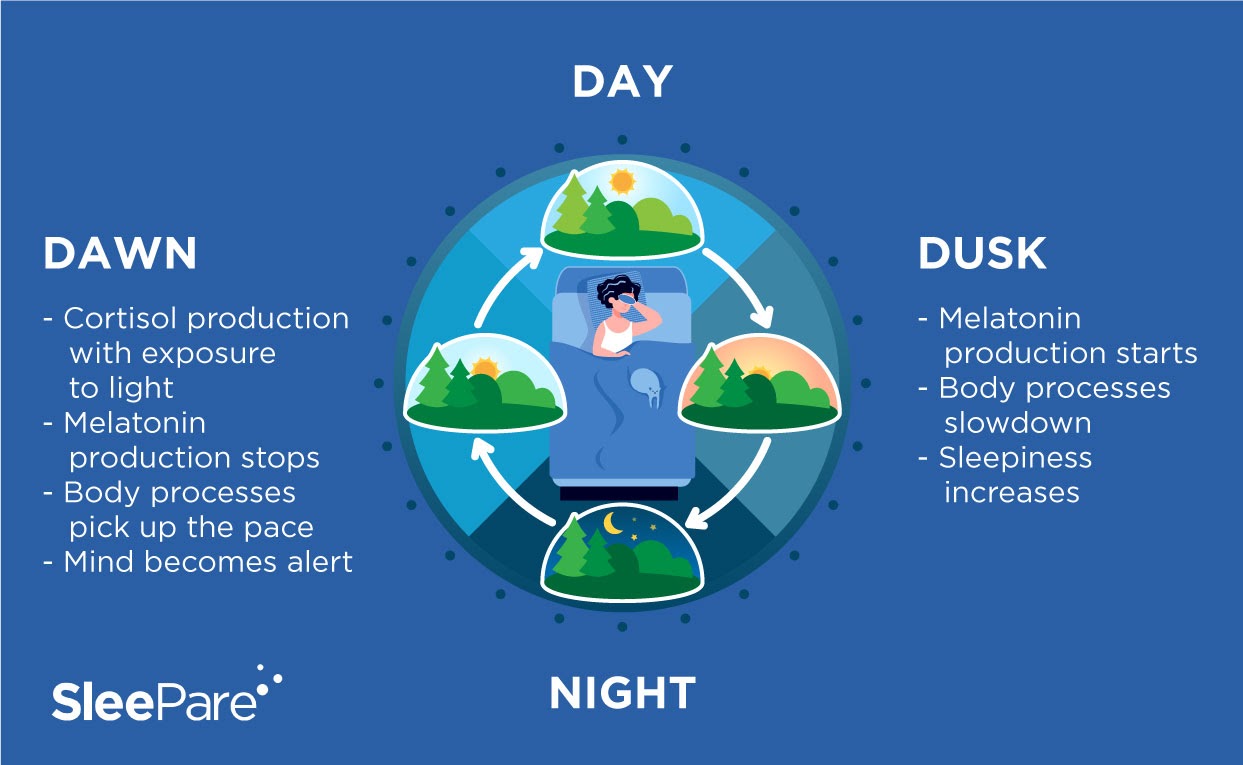
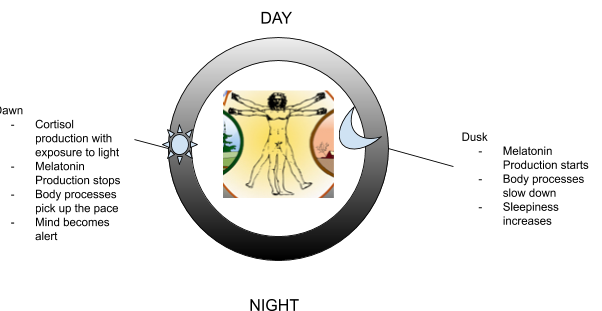
Circadian Rhythm works as your internal biological clock to regulate your sleep and wake up timings. It monitors your biological processes such as sleep, hunger drive, and hormones production over the 24-hr period.
In adults, the intense sleep need occurs between 2:00 – 4:00 a.m. at night and 1:00 – 3:00 pm during the day. However, these timings differ slightly according to your genes or chronotype, i.e., whether you’re a morning or night person.
Besides chronotype, exposure to light and dark is the strongest pacesetter of this process. Through the production of melatonin in the night and cortisol in the morning, it keeps your sleep-wake cycle consistent.
As night falls, your brain triggers the release of melatonin, a sleep-inducing hormone. It decreases your body temperature and allows your body to relax and sleep under the influence of sleep pressure.
Near dawn, melatonin secretion slows down. Around the same time, the body releases cortisol due to exposure to light and signals you to wake up.
Most people think of sleep as one big chunk of eight hours snooze. Such a sleep pattern is called monophasic sleep and is considered a healthy or normal sleeping pattern, but some scientists do not agree!
At the moment, scientists recognize three major sleep patterns, as shown in the table below.
| Monophasic | 8 hours sleep at night without any naps during the day |
| Biphasic | 6-7 hours sleep at night with a nap in the afternoon |
| Polyphasic | 90 minutes to 6 hours sleep at night with multiple 20-minute naps during the day to add up to 3-4 hours |
Today, polyphasic sleep is popular among next-gen professionals aiming for maximum productivity out of their day and night. Polyphasic sleepers sleep in chunks to optimize their rest and increase their productive hours without getting any sleep deprivation.
It’s not a new concept. A group of historians believes most human adults used to sleep 3 to 4 times a day until rapid industrialization imposed long working hours, forcing them to sleep in one long chunk at night.
It’s rumored that polyphasic sleep has fueled great minds, like Leonardo Da Vinci and Nikola Tesla, and its trending in Silicon Valley as well.
The proponents of this theory believe that polyphasic sleep quickly transitions you to slow-wave sleep and the REM phase. When your body is tired, NREM stage 1 and 2 are short, and the most restorative NREM, stage 3, is longer. As a result, by sleeping in chunks you need less sleep to get all the uber benefits of sleep.
However, sleep scientist Dr. Alon Avidan at Sleep Disorder Center at the University of California is against this trend. According to him, polyphasic sleep is not only dangerous, but no significant research supports its benefits for adults.
He strongly disapproves manipulation of sleep patterns because your body is attuned to circadian genes that release sleep and wake hormones as per the rise and fall of the sun. Many studies also reveal risks of health issues and shorter lifespan among graveyard and/or rotating shift workers.
However, Dr. Avidan supports a biphasic sleep cycle in which humans sleep during the night, wake up early and nap in the afternoon to release some of the sleep pressure. Biphasic sleep is the second most common pattern, also known as Siesta sleep. It’s part of many cultures, and Dr. Avidan notes that humans adopted it due to environmental factors or work requirements instead of any biological needs.
However, sleep expert Dr. Michael Breus, Ph.D., believes there’s no one-size-fits-all solution. He says, “Consistency is crucial to healthy sleep, no matter what sleep schedule you follow,” as your body adapts to whichever pattern you choose and follow consistently.
But, if you don’t snooze for long enough or your sleep quality is poor, it can have detrimental effects on your life. Let’s see how.
About 35% of Americans are sleep deprived, costing the nation $411 billion annually. Poor sleep affects their physical, mental, and emotional well-being. It leads to poor concentration levels, weak judgment, slow reaction time, mood swings, weight gain, and low perception of life.
According to the National Institutes of Health, an average adult sleeps less than seven hours each night. Although 6-7 hours of continuous sleep may sound enough, according to scientists, it can still lead you to sleep deprivation.
Sleep deprivation can occur due to a number of reasons. Many people think of sleep as a wastage of time and intentionally deprive themselves of sleep. But, other than that, the most common causes of sleep loss are discussed below:
Demanding lifestyle, shift work, family responsibilities, social activities, late-night assignments, and money-making pursuits; all encroach your sleep duration.
The modern world collides with our biological clock in many different ways. We spend our mornings in the dark inside and our nights in the bright light. It messes up our sleep-wake homeostasis and leaves us sleep-deprived and vulnerable.
Around 50-70 million U.S. population suffers from some kind of sleep disorder. Insomnia, sleep apnea, narcolepsy, and restless leg syndrome are a few common sleep-related issues.
They cause long-term sleep deprivation due to frequent sleep disturbances. Sleep experts can treat most of the sleep disorders by dealing with the underlying causes.
People above the age of 65 find it hard to sleep for long hours and cover up the deficit through daytime naps. Moreover, most elderly folks have poor sleep quality due to the prolonged light-sleep phase.
Their circadian rhythm also shifts to phase advance level, which requires early sleep and wake up time, but they continue staying up late. As a result, they miss sleep and become more susceptible to sleep disorders.
Many over-the-counter medications affect your sleep cycle. Cough and cold syrups are known to cause drowsiness and daytime somnolence, particularly problematic for allergy sufferers.
Medicines for high blood pressure and asthma can keep you awake till late at night. Since they are used for an indefinite time, they can cause various sleep issues for the patient.
Lack of sleep night after night puts considerable stress on our body’s resources. It hinders the repair and restoration of the body and upsets the sleep-wake cycle.
Accumulated sleep loss leads to what scientists like to call, the sleep debt.
Sleep debt is the collective effect of sleep loss when you don’t snooze enough regularly. If you sleep less than 8 hours regularly, it puts your body under a lot of stress, which continues to pile up.
When you don’t sleep enough, your body doesn’t get enough time to recover.
As this sleep debt keeps accumulating, you start to experience a decline in your physical and mental performance.
To establish this fact, two separate studies were performed, one by David Dinges at the University of Pennsylvania and another similar one by Gregory Belenky at Walter Reed Army Institute of Research in Silver Spring.
Both studies restricted groups of healthy men and women to different sleep hours for two weeks in the lab. The results were similar for both studies. They found that anything less than 8 hours of sleep showed unsatisfactory results in terms of sustained attention. The participants sleeping less than 8 hours showed a decline in performance with every passing day.
Belenky, Director of the Sleep and Performance Research Center at Washington State University, notes, “You don’t see it the first day. But you do in five to seven days. Unless you’re doing work that doesn’t require much thought, you are trading time awake at the expense of performance.”
The subjects that slept fewer hours produced poorer results earlier than the ones who slept a little more. However, those who slept more than 8 hours showed no better results than those who slept 8 hours every night.
Both experiments found 7.5 to 8 hours of sleep a good range for most adults. Further studies noted individual differences among sleepers.
Dinges notes these fluctuations are due to their genes; therefore, a sleeper who belongs to one group cannot train to become like those on another group.
The most astonishing observation was the fact that the participants were unable to notice their performance decline themselves.
Which makes one question, how do you know you are sleep deprived?
Sleep deprivation has some clear indicators, and if you pay attention, you can recognize them too. These include:
Sleep deprivation is common among children as they have high energy levels, increased drive for learning, and curiosity towards the environment. But unlike adults, when children are sleep deprived, they become more active and resist going to bed.
Many people think they can cover up for their sleep loss by snoozing more on the weekend. Let’s find out if that’s possible.
As per Dr. Alon Avidon, the University of California, “Sleep is not like a bank account. You can’t sleep for one hour, then two hours, and combine it with another four and say it’s seven hours.”
Researchers at Penn State University College of Medicine put 30 healthy individuals through a 13-night sleep laboratory experiment to investigate the cumulative cost of additional wakefulness.
After two nights of recovery sleep, 10 hours each, researchers noticed daytime sleepiness and inflammation markers return to normal, but the attention levels of the participants still showed a deficit.
However, other studies found combining recovery sleep followed by a nap during the day, a good strategy for a complete reversal of the adverse effects of sleep loss.
In fact, according to a study by NASA, 40-minutes of nap among sleepy military pilots and astronauts enhanced alertness by 100% and improved performance by 34%.
This data correlates with Dr. Avidon’s claim, “With sleep debt, you’re borrowing sleep at a very high-interest rate. For one hour of sleep, it takes a full (night) of normal sleep recovery to make up the difference.”
However, you should avoid naps later in the day because they can affect your nighttime sleep adversely.
Lack of sleep makes you sluggish and tired. But the effects of sleep deprivation are much more severe. Below are the most surprising yet grave consequences of accumulated sleep loss, i.e., sleep debt.
Constant sleep loss leads to various fatal diseases and increases the risk of mortality. About 90% of insomnia patients have other health conditions, such as heart diseases, diabetes, and obesity.
Restricting your sleep to a few hours increases your risk of blood sugar, insulin sensitivity, increased blood pressure, and stroke. In a study, healthy young men started showing signs of prediabetes within a week of restricting their sleep for 4-5 hours every night.
According to a study by the National Institutes of Health, 89% of sleep-deprived children and 55% of adults are at risk of gaining weight. Inadequate sleep increases the production of the hunger-stimulating hormone, ghrelin, and reduces appetite-controlling hormone, leptin. As a result, people who sleep less tend to eat more.
Chronic deprivation can cause your skin to lose luster, deepen fine lines, and cause dark circles. Poor sleep releases an increased amount of stress hormone, cortisol, which breaks down skin collagen, the protein responsible for skin elasticity.
If you sleep less, you are 3 times more likely to develop common cold and flu. Moreover, you may also take more time to recover, even with proper treatment. Proper sleep saves our body from inflammation and allergy issues.
Sleep restriction negatively affects our brain, and sleep debt leads to various psychological issues.
Lack of sleep is one of the biggest reasons for road accidents. It is one of the leading public safety hazards as sleep loss impairs reaction time, similar to that of alcohol intoxication.
According to a study in 2007, people having insomnia are five times more likely to develop depression. At the same time, 90% of the individuals suffering from depression complain of poor sleep quality.
Sleep debt impairs attention, concentration, and problem-solving skills. Lack of sleep also affects memory consolidation as you are unable to reach the deep sleep and REM stage crucial for learning.
Sleep deprivation for a prolonged time can show signs of mood disorders and emotional health problems.
When you starve your body off sleep, it impairs your social skills and inhibits your ability to judge emotions. Several facial recognition studies show that people who fall in the habit of sleeping less are unable to recognize the expressions of anger and happiness.
Sleep restriction can cause irritability, anger, and sadness; even if the sleep deprivation is for a few hours only. According to a study by the University of Pennsylvania, daytime sleepiness can negatively impact your mood for the day.
Sleep loss can limit our reaction to emotional stimuli due to unpredictable moods and diminished mental skills. It can manifest itself in the form of sudden outbursts, lashing out, dejection, and withdrawal.
In the past couple of decades, sleep quality has rapidly declined, leading the nation to sleep deprivation, sleep disorders, and resulting physical and mental problems. But the good news is, you can reverse most of the effects of sleep deprivation through a positive lifestyle.
You need to optimize your daily routine to achieve two goals:
Getting the right quantity of sleep is easy, but making your rest count requires consistency and thoughtful living.
Below are a few useful tips to help you optimize both the quality and quantity of sleep so you can lead a healthy life.
First, figure out whether you’re an early bird or a night owl and set your bedtime accordingly. You may feel tired after a full night’s sleep if your bedtime doesn’t match with your chronotype, i.e., your internal clock.
So, you’ll need to synchronize your sleep timing to your circadian rhythm to get the best rest.
Most sleep calculators use the following criteria to calculate your bedtimes.
The following table shows some of the bedtimes according to the above formula.
Bedtime (7.5 hours, 5 cycles) | Bedtime (9 hours, 6 cycles) | |
| 6:00 a.m. | 10:15 a.m. | 8:45 p.m. |
| 6:30 a.m. | 10:45 a.m. | 9:15 p.m. |
| 7:00 a.m. | 11:15 a.m. | 9:45 p.m. |
| 7:30 a.m. | 11:45 a.m. | 10:15 p.m. |
| 8:00 a.m. | 12:15 a.m. | 10:45 p.m. |
| 8:30 a.m. | 12:45 a.m. | 11:15 p.m |
| 9:00 a.m | 1:15 a.m. | 11:45 p.m. |
If you feel tired after sleeping for 7.5 hours, add 15 more minutes to your sleep duration until you find the exact number of hours that work best for you.
Waking up a few minutes before your alarm goes off is a great way to start your day. Otherwise, you may feel groggy and tired in the morning. Conversely, if you’re waking up way before your alarm clock goes off, then shift your bedtime or wake up time accordingly.
Millions of people use sleep apps like Sleep Cycle to keep track of their sleep. These apps can record sound, movement, heart rate, respiration, and other physiological changes while you’re asleep. You can use this data to adjust your sleep schedule for optimal performance.
Sleep quality depends on the duration of slow-wave and REM stage of your sleep cycle. Obviously, you cannot control how much time you spend in any of the phases of sleep.
However, you can make lifestyle modifications to influence your sleep cycle and pave the way to deeper sleep.
Uncluttered bedrooms calm an anxious mind instantly. The entire room, curtains, pillows, and of course the bed and the mattress should be harmonious to each other and your body.
Irrespective of your choice of mattress type (memory foam, latex, innerspring, or hybrid), it’s absolutely important to get the comfort right. Since comfort is quite subjective, it’s always better to test different mattresses in showrooms and get the one that fits the bill the most.
Instead of dreading about your sleep struggles, focus on what you achieved during the day and what you look forward to the next day. Clear your mind of any worries and stay positive; you will fall asleep before you even know it.
An energized day promotes sleep satisfaction by boosting your sleep-wake homeostasis.
The end goal here is to achieve sleep satisfaction and optimize performance. But, continued sleep deprivation puts your body under a lot of stress, and weekend recovery sleep is not enough to cover this deficit.
So if you want to sleep better and improve your productivity, it may seem counter-initiative, but you need to pay more attention to your sleep daily!

 Showrooms
Showrooms
About The Author
Dustin Morgan
Sleep Expert & Store Manager
Dustin Morgan is the Chief Mattress Analyst and Sleep Technology Expert at SleePare. He combines his computer science background with his passion for sleep innovation. With personal experience testing over 200 mattresses, Dustin offers unmatched insights into finding the perfect sleep solution for various needs. His work focuses on delivering honest and detailed comparisons and advice to help individuals achieve their best sleep. When he is not exploring the latest sleep technology, Dustin enjoys spending time in the great outdoors and gaming in his Virginia home.